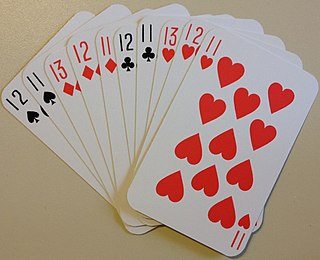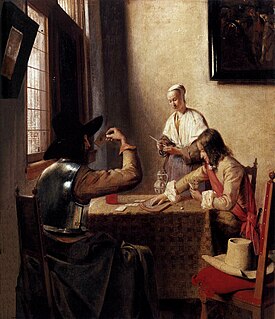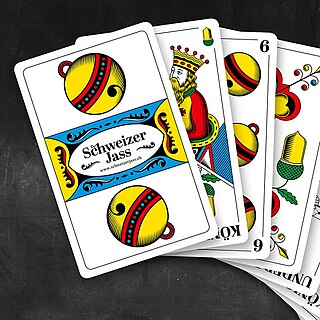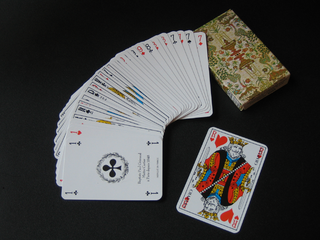
Pinochle, also called pinocle or penuchle, is a trick-taking, Ace-Ten card game typically for two to four players and played with a 48-card deck. It is derived from the card game bezique; players score points by trick-taking and also by forming combinations of cards into melds. It is thus considered part of a "trick-and-meld" category which also includes the game belote. Each hand is played in three phases: bidding, melds, and tricks. The standard game today is called "partnership auction pinochle".

Sheepshead or Sheephead is an American trick-taking card game derived from Bavaria's national card game, Schafkopf. Sheepshead is most commonly played by five players, but variants exist to allow for two to eight players. There are also many other variants to the game rules, and many slang terms used with the game.

A trick-taking game is a card or tile-based game in which play of a hand centers on a series of finite rounds or units of play, called tricks, which are each evaluated to determine a winner or taker of that trick. The object of such games then may be closely tied to the number of tricks taken, as in plain-trick games such as Whist, Contract bridge, Spades, Napoleon, Euchre, Rowboat, Clubs and Spoil Five, or to the value of the cards contained in taken tricks, as in point-trick games such as Pinochle, the Tarot family, Mariage, Rook, All Fours, Manille, Briscola, and most evasion games like Hearts. The domino game Texas 42 is an example of a trick-taking game that is not a card game. Trick-and-draw games are trick-taking games in which the players can fill up their hands after each trick. In most variants, players are free to play any card into a trick in the first phase of the game, but must follow suit as soon as the stock is depleted. Trick-avoidance games like Reversis or Polignac are those in which the aim is to avoid taking some or all tricks.

500 or five hundred, also called bid Euchre is a trick-taking game that is an extension of euchre with some ideas from bridge. For two to six players, it is most commonly played by four players in partnerships, but is sometimes recommended as a good three-player game. It arose in America before 1900 and was promoted by the United States Playing Card Company, which copyrighted and marketed the rules in 1904. 500 is a social card game and was highly popular in the United States until around 1920 when first auction bridge and then contract bridge drove it from favour. 500 continues to enjoy popularity in Ohio and Pennsylvania, where it has been taught through six generations community-wide, and in other countries: Australia, New Zealand, Canada (Quebec) and Shetland. The originator of Five Hundred, US Playing Card Company of Cincinnati, Ohio, now has headquarters across the Ohio River in Erlanger, Kentucky. Five hundred is promoted by some as the national card game of Australia.

Euchre or eucre is a trick-taking card game commonly played in Australia, Canada, New Zealand, Great Britain, and the United States. It is played with a deck of 24, 28, or 32 standard playing cards. Normally there are four players, two on each team, although there are variations that range from two to nine players.

Spades is a trick-taking card game devised in the United States in the 1930s. It can be played as either a partnership or solo/"cutthroat" game. The object is to take the number of tricks that were bid before play of the hand began. Spades is a descendant of the Whist family of card games, which also includes Bridge, Hearts, and Oh Hell. Its major difference as compared to other Whist variants is that, instead of trump being decided by the highest bidder or at random, the Spade suit always trumps, hence the name.

Marjapussi is a traditional Finnish partnerships trick taking game. The speciality of Marjapussi is that the trump suit is determined in the middle of the play by declaring a marriage. To win a game, a partnership must get exactly twelve points. A very similar game evidently related to Sixty-six, but with a curious resonance of All Fours is played in Sweden under the name Bondtolva, Farmer's Dozen.
Belote is a 32-card, trick-taking, Ace-Ten game played primarily in France and certain European countries, namely Armenia, Bulgaria, Croatia, Cyprus, Greece, Luxembourg, Moldova, North Macedonia and also in Saudi Arabia. It is one of the most popular card games in those countries, and the national card game of France, both casually and in gambling. It was invented around 1920 in France, and is a close relative of both Klaberjass and Klaverjas. Closely related games are played throughout the world. Definitive rules of the game were first published in 1921.
Pedreaux is an American trick-taking card game of the All Fours family based on Auction Pitch. Its most popular variant is known as Cinch, Double Pedro or High Five. Developed in Denver, Colorado, in the 1880s, it was soon regarded as the most important member of the All Fours family. Although it went out of fashion with the rise of Auction Bridge, it is still widely played on the western coast of the United States and in its southern states, being the dominant game in some locations in Louisiana. Forms of the game have been reported from Nicaragua, the Azores, Italy and Finland. The game is primarily played by four players in fixed partnerships, but can also be played by 2–6 individual players.
Pitch is an American trick-taking card game derived from the English game of All Fours. Historically, Pitch started as "Blind All Fours", a very simple All Fours variant that is still played in England as a pub game. The modern game involving a bidding phase and setting back a party's score if the bid is not reached came up in the middle of the 19th century and is more precisely known as Auction Pitch or Setback. Whereas All Fours started as a two-player game, Pitch is most popular for three to five players. Four can play individually or in fixed partnerships, depending in part on regional preferences. Auction Pitch is played in numerous variations that vary the deck used, provide methods for improving players hands, or expand the scoring system. Some of these variants gave rise to a new game known as Pedro or Cinch.

Krutzjass is a Swiss German trick-taking card game in some ways similar to Contract bridge. The name, literally translated into English, is Cross-Game, a name derived from the fact that it is played between two teams or partnerships of two, where team members sit opposite each other, with an opponent on either side. There are many variants of the game, however, this article deals primarily with the double-deck variant.

Bid Euchre, Auction Euchre, Pepper or Hasenpfeffer, is the name given to a group of card games played in North America based on the game Euchre. It introduces an element of bidding in which the trump suit is decided by which player can bid to take the most tricks. The primary differences are the number of cards dealt, absence of any undealt cards, the bidding and scoring process, and the addition of a no trump declaration. It is typically a partnership game for four players, played with a 24, 32 or 36-card pack, or even two decks of 24 cards each. It should not be confused with another game also called Bid Euchre q.v. Five Hundred.

Jass is a trick taking, Ace-Ten card game and a distinctive branch of the Marriage family. It is popular throughout the Alemannic German-speaking area of Europe (German-speaking Switzerland, Liechtenstein, Alsace part of France, Vorarlberg province of Austria, southwestern Germany, as well as in Romansh-speaking Graubünden and the French-speaking area of Switzerland, German-speaking South Tyrol in Italy, and in a couple of places in Wisconsin, USA.
304, pronounced three-nought-four, is a trick-taking card game popular in Sri Lanka, coastal Karnataka, Tamil Nadu and Maharashtra, in the Indian sub continent. The game is played by two teams of two using a subset of the 52 standard playing cards so that there are 32 cards in play.
Smear is a North-American trick-taking card game of the All Fours group, and a variant of Pitch (Setback). Several slightly different versions are played in the Upper Peninsula of Michigan, Minnesota, Northern and Central Iowa, Wisconsin and also in Ontario, Canada.

Euchre is a 19th-century trick-taking card game and has many variations.

Manille is a French trick-taking card game which uses a 32 card deck. It spread to the rest of France in the early 20th century, but was subsequently checked and reversed by the expansion of Belote. It is still popular in France and the western part of Belgium.

Euchre has many variations in game playing. Some of them are designed for two, three, five or more players. Below is an incomplete list of major notable variations of the game.

The following is a glossary of terms used in card games. Besides the terms listed here, there are thousands of common and uncommon slang terms. Terms in this glossary should not be game-specific, but apply to a wide range of card games. For glossaries that relate primarily to one game or family of similar games, see Game-specific glossaries.

The card game of Bauernschnapsen is an expanded form of the popular Austrian card game of Schnapsen, played by four players. This variant of Schnapsen is played throughout the whole of Austria.












